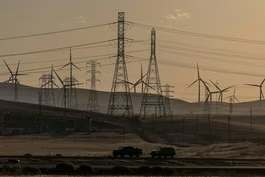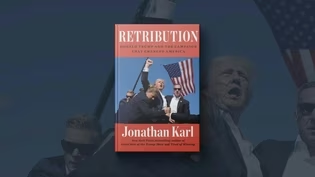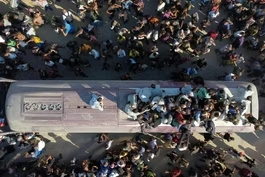
A look at the destruction in Jamaica after Hurricane Melissa
Clip: 10/29/2025 | 8m 19sVideo has Closed Captions
A look at the destruction in Jamaica after Hurricane Melissa's landfall as a Category 5
Initial estimates show Hurricane Melissa may have killed dozens across Haiti and Jamaica. Melissa is one of the strongest storms the region has ever seen, leaving widespread destruction in multiple Caribbean nations. To discuss the ongoing rescue and relief efforts, Amna Nawaz spoke with Brian Bogart of the World Food Programme.
Problems playing video? | Closed Captioning Feedback
Problems playing video? | Closed Captioning Feedback
Major corporate funding for the PBS News Hour is provided by BDO, BNSF, Consumer Cellular, American Cruise Lines, and Raymond James. Funding for the PBS NewsHour Weekend is provided by...

A look at the destruction in Jamaica after Hurricane Melissa
Clip: 10/29/2025 | 8m 19sVideo has Closed Captions
Initial estimates show Hurricane Melissa may have killed dozens across Haiti and Jamaica. Melissa is one of the strongest storms the region has ever seen, leaving widespread destruction in multiple Caribbean nations. To discuss the ongoing rescue and relief efforts, Amna Nawaz spoke with Brian Bogart of the World Food Programme.
Problems playing video? | Closed Captioning Feedback
How to Watch PBS News Hour
PBS News Hour is available to stream on pbs.org and the free PBS App, available on iPhone, Apple TV, Android TV, Android smartphones, Amazon Fire TV, Amazon Fire Tablet, Roku, Samsung Smart TV, and Vizio.
Providing Support for PBS.org
Learn Moreabout PBS online sponsorshipGeoff: Welcome to the newshour, caribbean islands have suffered terrible devastation due to hurricane Melissa.
Amna: Melissa is one of the strongest storms the region has ever seen, leaving widespread destruction in multiple caribbean nations.
Hurricane landed first on Jamaica as a category five storm.
It was the strongest storm to ever hit Jamaica, leaving streets submerged, homes destroyed and 77% of the island without power.
>> Nice, nice homes gone.
Amna: In this fishing village of alligator pond, residents begin to piece back together their lives.
>> We've got to pick up the tools, the claw bar, the hammer, and move on to the future, hoping never to see a storm like this again.
>> It was terrible.
Witnessed trees.
It was terrible.
The wind, it was terrible.
Amna: Despite the devastation, Alvin said this area will survive.
>> We go down and come back up.
Amna: But Dennis sulu, the united nation's coordinator for the region, warned of long issues.
>> There is a very likely possibility that Jamaica will have issues for the coming months.
What we are seeing in preliminary assessments is a country that has been devastated to levels never seen before.
Amna: Melissa made landfall as a category five hurricane Tuesday morning on the southern coast of Jamaica.
Early Wednesday, it hit Cuba, weakening to category 2 as it moved across the island, headed to Haiti and Turks in Pecos.
It will reach the Bahamas later today before reaching bermuda and into the atlantic.
Before the storm hit Cuba, over 700,000 hit -- saw shelter.
>> It was hell all night.
The wind has been terrible.
Amna: Even as a category 3 storm, it has wreaked havoc.
>> The impact was brutal, first there was a strange calm, then suddenly it roared like a wild beast.
I had to run for cover, there was nothing I could do.
Amna: Haiti was spared a direct hit.
But people were killed and floods after a river burst its banks.
Residents in the already impoverished nation do their best to stay dry.
>> I'm living with the kids, I have nothing to get them.
Mna: Secretary of state Marco Rubio said supplies were sent to the area, but for many in the region, it was too little and too late.
We turn now to Brian Bogart, the world food programme country director for caribbean operations, and joins us now from Jamaica's capital of Kingston.
Thank you for being with us.
What can you tell us about what you are seeing on the ground in Kingston and what you are hearing about the extent of the damage on the rest of the island?
Brian: Sure, I've just seen some of the first images coming through from a survey that has flown over the parish of saint Elizabeth where hurricane Melissa made landfall as a category five with the wind exceeding 175 miles per hour.
It looks absolutely devastating.
This is the first imagery that allowed me to grasp the extent of the damage, the destruction is what I should say.
We have teams on the ground right now who are trying to make contact with these communities, trying to understand what the logistics network looks like and how we can access those communities.
Hat is really the ultimate priority in addition to search and place.
Amna: Jamaicans in the area have seen hurricanes before.
Is there anyway to compare the storm to storms of the past?
Brian: Sadly, I was there almost a year ago when it became a category four storm and devastated it.
This is an area that is a coastal community with lots of people who are fisherfolk and also the agriculture country.
It is sad to say it is much worse than last year.
Last year was extremely damaging for those communities as well.
People have invested in reconstructing their homes and tried to get back on their feet.
A year later, and even more devastating system has passed through their communities.
It is devastating.
Amna: A you and official mentioned there could be long-term consequences particularly because of the agricultural areas.
Do you have the resources that you need to seek long-term support for Jamaica and the region?
Brian: I think your point is valid.
We are very much in need.
In an area like this where communities are completely devastated and the country is being undermined, we need to have a longer-term perspective, both to meet people's immediate needs but also to invest in those communities to get back on their feet and be able to produce for the rest of the country.
Amna: In terms of immediate need , the U.S.
Is sending relief teams.
What can you tell us about the American official efforts and what else is desperately needed right now one ground?
Brian: We have always coordinated extremely well with our partners in the government in the United States and we continue to count on their support, their leadership to help us respond to crises like this.
We are in constant communication.
We are enjoying incredibly close collaboration and what is really critical for us now is to be able to move supplies, not only food, but also shelter, water and sanitation equipment, and logistics assets, mobile warehousing, forklifts, generators, the types of equipment we need to substitute so we can serve support into the communities and we are talking about saving lives and it is absolutely urgent that we do so so we need transport capability.
E are working with private sector partners.
Nd anyone delivering lifesaving support to the people in Jamaica.
Amna: All right, that is Brian Bogart from the world food programme joining us from Kingston, Jamaica.
We are sending all of your best wishes to you and your team.
Brian: Thank you very much.
♪
How data center power demand could lower electricity prices
Video has Closed Captions
Clip: 10/29/2025 | 6m | How data center power demand could help lower electricity prices (6m)
Jonathan Karl explores Trump's focus on retribution in book
Video has Closed Captions
Clip: 10/29/2025 | 7m 36s | Jonathan Karl explores Trump's focus on retribution in new book (7m 36s)
News Wrap: Fed cuts interest rates for 2nd time this year
Video has Closed Captions
Clip: 10/29/2025 | 6m 23s | News Wrap: Federal Reserve cuts interest rates for 2nd time this year (6m 23s)
Palestinians: Bodies returned by Israel show signs of abuse
Video has Closed Captions
Clip: 10/29/2025 | 10m 3s | Palestinians say bodies and detainees returned by Israel show signs of torture and abuse (10m 3s)
Top researchers consider leaving U.S. amid funding cuts
Video has Closed Captions
Clip: 10/29/2025 | 8m 55s | Top researchers consider leaving U.S. amid funding cuts: 'The science world is ending' (8m 55s)
Vance joins Erika Kirk in Miss. for Turning Point USA event
Video has Closed Captions
Clip: 10/29/2025 | 4m 55s | Vance joins Erika Kirk at University of Mississippi for Turning Point USA event (4m 55s)
Providing Support for PBS.org
Learn Moreabout PBS online sponsorship
- News and Public Affairs

FRONTLINE is investigative journalism that questions, explains and changes our world.

- News and Public Affairs

Amanpour and Company features conversations with leaders and decision makers.












Support for PBS provided by:
Major corporate funding for the PBS News Hour is provided by BDO, BNSF, Consumer Cellular, American Cruise Lines, and Raymond James. Funding for the PBS NewsHour Weekend is provided by...





